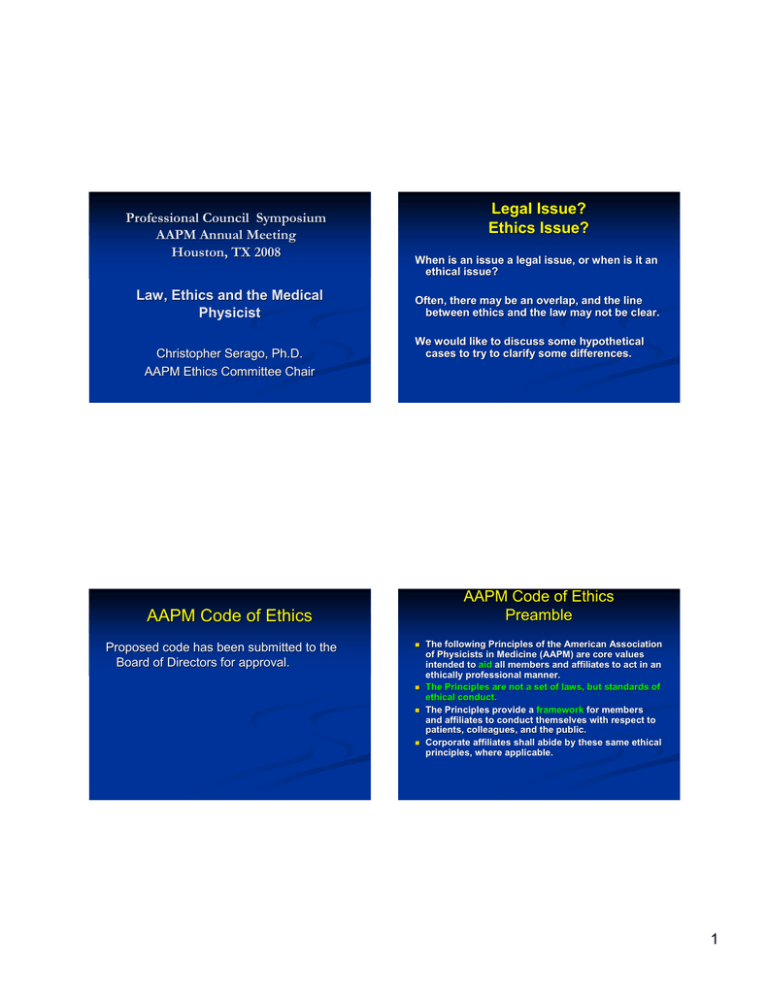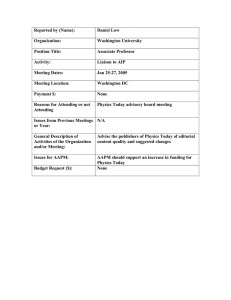
Professional Council Symposium
AAPM Annual Meeting
Houston, TX 2008
Law, Ethics and the Medical
Physicist
Christopher Serago, Ph.D.
AAPM Ethics Committee Chair
AAPM Code of Ethics
Proposed code has been submitted to the
Board of Directors for approval.
Legal Issue?
Ethics Issue?
When is an issue a legal issue, or when is it an
ethical issue?
Often, there may be an overlap, and the line
between ethics and the law may not be clear.
We would like to discuss some hypothetical
cases to try to clarify some differences.
AAPM Code of Ethics
Preamble
The following Principles of the American Association
of Physicists in Medicine (AAPM) are core values
intended to aid all members and affiliates to act in an
ethically professional manner.
The Principles are not a set of laws, but standards of
ethical conduct.
The Principles provide a framework for members
and affiliates to conduct themselves with respect to
patients, colleagues, and the public.
Corporate affiliates shall abide by these same ethical
principles, where applicable.
1
AAPM Code of Ethics
Principles
I. Members shall strive to provide the best quality
patient care with competent and professional
service.
This is a higher bar than avoidance of legal negligence.
The miserable workplace
Case report Misery
Junior medical physicist’
physicist’s story.
My job is unpleasant. There is so much work that I always feel stressed.
stressed.
The chief physicist, who is my supervision, is not very supportive.
supportive.
He/she makes jokes about me and others at group meetings.
He/she never disputes false rumors about me.
He/she gives me unreasonable deadlines to complete a task, followed
followed
by detailed questions about why the work is not finished. Sometimes
Sometimes
he/she reassigns the work to another physicist.
He/she gives me the silent treatment, and never stops by my workplace
workplace
to chat with me.
He/she never praises my work.
Does this person have the basis for a legal complaint?
An ethical complaint?
Federal Laws Prohibiting Job
Discrimination
Title VII of the Civil Rights Act of 1964 (Title VII), which
prohibits employment discrimination based on race,
color, religion, sex, or national origin;
The Equal Pay Act of 1963 (EPA), which protects men
and women who perform substantially equal work in the
same establishment from sexsex-based wage
discrimination;
The Age Discrimination in Employment Act of 1967
(ADEA), which protects individuals who are 40 years of
age or older;
Title I and Title V of the Americans with Disabilities Act of
1990 (ADA), which prohibit employment discrimination
against qualified individuals with disabilities in the private
sector, and in state and local governments;
The miserable workplace
Case report Misery
Chief medical physicist’
physicist’s story.
We have a very busy practice. Besides my own work, I have 8
medical physicists to supervise. Everyone is working hard to do
the best job possible for our patients and institution.
It’
It’s true that I use humor in the workplace. That’
That’s my attempt to
lighten up the gravity of a stressful work environment.
The junior physicist never came to me about any false rumors.
How can I possibly dispute false rumors unless I hear them. I try
try
to stay out of the office rumor mill.
I try to give reasonable deadlines for the assigned work, but our
our
job does not always end at 5:00 pm. On several occasions, I
have had to reassign work to another physicist so it would be
completed.
It’
It’s true that I don’
don’t socialize much during the day. On the other
hand, my office door is always open, and the junior physicist
never exercises the opportunity to visit and communicate with
me.
Just because I don’
don’t verbally acknowledge when good work done,
doesn’
doesn’t mean I don’
don’t appreciate it.
2
Legal perspective
Is the junior physicist in a protected class?
Is this an isolated incident or a pattern of
behavior?
Is the “humor”
humor” of the chief physicist racially,
sexually, culturally based?
Is the workload equitably divided?
Does the chief physicist socialize with the
rest of the group and ignore the junior
physicist?
Is this employee being singled out?
Office relationships
Case report Unwanted Attention
Medical physicist’
physicist’s story.
I suspect the director of physics wants to start a romantic
relationship with me. He/she has asked me on several
occasions whether I want to join him/her and some of the
medical staff who meet socially Friday after work. I’
I’ve politely
refused and let him/her know that I’
I’m not interested.
At an out of town conference we both attended, he/she invited
me to join a sales rep for dinner to discuss equipment our
department is considering for purchase. I said I would be
happy to meet with the vendor and him/her but not for dinner.
I think he/she was irritated.
I am not included in all departmental meetings, and I received a
poor evaluation from him/her. I’
I’m ready to look for another
job. My future here is bleak.
Ethical perspective
AAPM Code of Ethics (draft)
Harassment
Members should contribute to a work environment
where people can do their best, most productive
work. Members should use positive, supportive
language. Verbal abuse, demeaning comments,
uncontrolled angry exchanges, or any conduct
that directly or indirectly creates a hostile work
environment is not acceptable.
Principle VII
The relationship among members of the Association
and other health professionals shall be open,
collegial, and based on mutual respect.
Office relationships
Case report Unwanted Attention
Director of physics story
A group of the medical staff meets on an occasional Friday
after work, and I have asked the medical physicist if
he/she would like to join us. I thought I was being
inclusive.
At the out of town meeting I did ask him/her to join me and
the sales rep for dinner. The equipment we are
considering for purchase is expensive, complex and a
detailed conversation is required.
The only departmental meeting he/she was not invited to
were those not pertaining to his/her work.
It’
It’s true that he/she received a poor evaluation from me
based on a documented record or poor performance.
Does this person have the basis for a legal complaint?
An ethical complaint?
3
Legal perspective
Ethical perspective
AAPM Code of Ethics (draft)
When does questionable behavior rise
to the level of sexual harassment?
Sexual harassment
Members shall not sexually harass anyone with whom they
have a professional relationship. Sexual harassment is
an unwelcome sexual advance, a request for sexual
favors, or other verbal or physical conduct of a sexual
nature.
Professional relationships
Members shall strive to have mutually beneficial
relationships with their colleagues. All such interactions
should be open, honest, and respectful. Where
appropriate, members shall strive to share their skill and
experience and to assist the professional development of
colleagues. Those who are in a supervisory position
have an obligation to guide their associates.
The subjective perception of the person is
important – touching, space is subjective
Is the person in a position of power?
Obvious sexual harassments incidents:
Expectation of sex for promotion
Sexual contact
Graduate students blues
Case report Blues
Grad student
I am not progressing towards the completion of my graduate
program as quickly as I would like. I think my advisor/mentor is
holding me back and taking advantage of me.
My advisor/mentor keeps changing the goals and timelines of
projects I am assigned to work on.
My advisor/mentor many times has had me repeat or redo my
research records, thus slowing down my progress.
I made QA measurements for a year, yet I’
I’m not going to be a
coauthor of a paper within which these measurements are
used.
Does this person have the basis for a legal complaint?
An ethical complaint?
Graduate students blues
Case report Blues
Advisor/Mentor
This grad student appears to believe that “putting in the time”
time” is
sufficient.
He/she doesn’
doesn’t seem to be able to complete a goal. Too much of
his/her work is unorganized and unfinished.
His/her research records are often sloppy. I often need to request
request
the records be done better.
He/she expected that routine QA measurements made as part of
his/her clinical training entitled him/her to be a coauthor of a
paper using those measurements. I explained that simply
collecting data was not sufficient to be included as a coauthor,
but he/she would be acknowledged for his/her contribution.
4
Legal perspective
Is the student in a protected class?
Are all graduate students treated, evaluated
fairly & equally?
Is there any cultural, sexual, race, age bias?
What is the reason(s)
reason(s) for changing the student’
student’s
goal & timelines
Are the requirements for graduation well
defined?
Dizzy coco-worker
Case report Dizzy
I am concerned about one of my coco-workers, with whom I am
socially friendly. We have a good time together on the
weekends, but I worry that occasionally he/she gets carried
away and drinks excessively.
On Monday mornings he/she complains of headaches, or sinus
problems, or allergies, or a touch of the flu. I’
I’m not with him/her
every weekend so I’
I’m not sure that the “medical conditions”
conditions”
are related to excessive drinking.
I’m concerned that his/her ability to concentrate may be
compromised. He/she often participates on critical patient
procedures.
I don’
don’t want to damage our working relationship, and worry that
reporting his/her occasional weekend drinking binges would
show a lack of mutual respect. Besides, I don’
don’t know with 100%
certainty that the drinking and Monday morning maladies are
related.
Ethical perspective
AAPM Code of Ethics (draft)
Student program completion
Teachers shall endeavor to contribute to the intellectual
development and to support students in achieving their
education goals.
They shall guide students toward an efficient path to
reaching these goals. Students entrust their educational
outcome in their teachers, advisers, and mentors.
As such, teachers shall act as advocates for their students.
For example, work on institutional grants or research
projects that primarily benefits the teacher or institution
may be a component of a student’
student’s education, but
should not unduly delay his or her overall progress.
Legal perspective
Case report Dizzy
My understanding…
understanding….
There is no legal obligation to report.
Does this person have a legal obligation to file a report?
An ethical complaint?
5
Ethical perspective
AAPM Code of Ethics (draft)
Principle XII
Members shall strive to protect the safety and welfare of patients.
Guidelines
O. Response to impaired or incompetent colleagues
The safety and welfare of patients are primary concerns of members.
If, due to some impairment, a colleague is perceived to jeopardize the
patient’s welfare, members should attempt to respond on the patient's
behalf. The particular circumstances may be ambiguous and
members should proceed judiciously.
Aging Accelerator
Case report Aging
I am a recent graduate from a CAMPEP accredited medical
physics program and a new employee at Hospital XYZ. I’
I’m
concerned about the quality of medical physics practice here.
There is an older accelerator at Hospital XYZ that doesn’
doesn’t meet all
of the tolerances recommended by TG 40 for linac QA.
For example, the gantry isocenter accuracy is greater that a 2mm
diameter, and the table top sags more than 2 mm.
The incumbent physicist says that the patient treatments given on
on
the older linac are designed with the increased linac
inaccuracies in mind.
I was taught to follow all of the TG 40 recommendations in my
graduate program. I’
I’m worried about the quality of patient care.
Does this person have the basis for a legal complaint?
An ethical complaint?
Aging Accelerator
Case report Aging
AAPM task group reports and the recommendations
within the reports have no legal standing on their
own.
Some states may incorporate part(s)
part(s) of AAPM task
group reports
Coming soon…
soon…
The AAPM Code of Ethics may be found on
the AAPM web site.
Thank
You!
6

